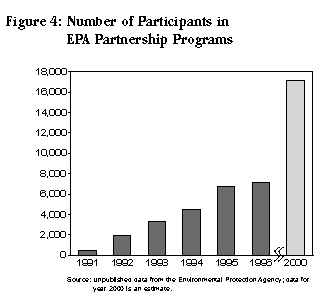
Archive
Since 1992, EPA has more than tripled membership in its "Partners for the Environment" program, with over 7,100 companies now participating.(2) One of these partnerships was forged by EPA's Regional Administrator in Boston, John DeVillars, with The Gillette Company, which has a good track record of compliance. Under a program DeVillars calls "Star Track," an independent firm audits Gillette's compliance with environmental regulations, and makes the audit reports public. Gillette pays the cost of the audit and gets amnesty to fix non-criminal violations without being fined. EPA makes no other inspections, and Gillette makes no other reports.
In March 1995, President Clinton offered this additional challenge to companies: "If you can meet even higher environmental performance standards, we will provide flexibility and cut red tape so you can find the cheapest, most efficient way to do it." Today, EPA's Project XL -- for excellence and leadership -- has more than a dozen projects with industries, states, and cities getting underway around the country.
Altogether, EPA's partners removed from circulation an estimated 4 billion pounds of planetary poisons just in the last year.(3) Since the companies did it their way, instead of Washington's way, they saved $360 million in the process. It is such a clear winner that EPA expects to sign up 10,000 new partners in the next four years.(4) (See Figure 4.)